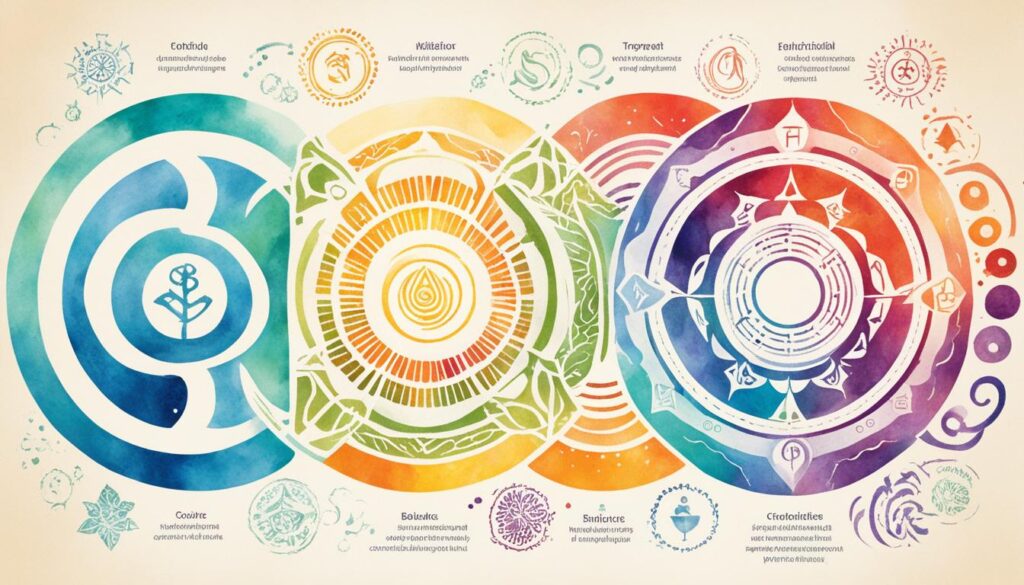“The mind is everything. What you think, you become.” – Buddha
Welcome to an exploration of Buddhism, one of the most influential belief systems in the world. Rooted in ancient wisdom and founded by Siddhartha Gautama, Buddhism offers a profound perspective on life, suffering, and the pursuit of enlightenment. By delving into its core beliefs and teachings, you will gain valuable insights into the principles and philosophy that guide millions of individuals worldwide.
Buddhism emphasizes the impermanence of life and the nature of suffering. It presents a path to end suffering through the Middle Way and the Eightfold Path, teachings that provide practical guidance for personal growth and enlightenment. Through meditation and the practice of mindfulness, Buddhists seek inner stillness, self-awareness, and ultimately, liberation from suffering.
Throughout this exploration of Buddhism, we will delve into the Three Universal Truths, the Four Noble Truths, and the principles of the Middle Way and the Eightfold Path. We will also explore the significance of meditation as a transformative practice and its role in achieving enlightenment.
As we embark on this journey, we invite you to reflect on the powerful words of Buddha: “The mind is everything. What you think, you become.” Let these words inspire you as we deepen our understanding of Buddhism and its teachings, offering insights that can shape our perspective and transform our lives.
Key Takeaways:
- Buddhism is a major global religion that originated in South Asia.
- The core beliefs of Buddhism revolve around the impermanence of life and the nature of suffering.
- The Three Universal Truths highlight the transient nature of existence and the futility of material possessions.
- The Four Noble Truths address the nature of suffering, its cause, its end, and the path to end suffering.
- The Middle Way encourages a balanced approach to life, avoiding extremes, while the Eightfold Path provides practical principles for personal growth and reaching enlightenment.
- Meditation is a central practice in Buddhism, allowing individuals to cultivate mindfulness, seek enlightenment, and achieve inner stillness.
- Buddhism offers valuable insights for addressing challenges and finding harmony in our personal lives and society.
The Three Universal Truths and the Four Noble Truths
In Buddhism, the Three Universal Truths and the Four Noble Truths serve as the cornerstone of the teachings. These profound truths offer guidance on understanding the nature of existence and provide a path to liberation.
The Three Universal Truths
- Impermanence: Everything in life is impermanent and ever-changing. This truth reminds us that nothing in this world is permanent, and holding onto attachments leads to suffering.
- True Happiness: A life solely based on material possessions does not bring genuine happiness. True happiness is found within, through cultivating inner qualities and embracing a meaningful existence.
- No Permanent Soul: Buddhism rejects the notion of an eternal, unchanging soul. Instead, it emphasizes the concept of anatta, which means there is no inherent, independent self. Understanding this truth challenges our egocentric view and promotes interconnectedness.

The Four Noble Truths
- Truth of Suffering: Life is inherently characterized by suffering, encompassing physical and mental pain, dissatisfaction, and unsatisfactoriness. This truth highlights the universal nature of suffering.
- Truth of the Cause of Suffering: The cause of suffering is craving and attachment. It is our desires, attachments, and illusions that give rise to suffering. By understanding and addressing these sources of attachment, we can alleviate suffering.
- Truth of the End of Suffering: There is an end to suffering. Nirvana, the ultimate goal of Buddhist practice, represents the cessation of suffering. Attaining nirvana brings liberation, peace, and freedom from the cycle of rebirth.
- Truth of the Path: The Eightfold Path is the path to end suffering and achieve enlightenment. It consists of eight principles: right understanding, right values, right speech, right action, right work, right effort, right mindfulness, and right meditation. Following this path leads to personal transformation and awakening.
By recognizing and embracing these truths, individuals can gain deep insights into the nature of existence and find a path towards liberation and inner peace.
The Middle Way and the Eightfold Path
In Buddhism, the Middle Way is the guiding principle that encourages individuals to lead a balanced life, avoiding both extremes of indulgence and austerity. It advocates for finding a harmonious path that encompasses all aspects of human existence.
The Eightfold Path, also known as the Noble Eightfold Path, is the practical application of the Middle Way and serves as a roadmap towards enlightenment. It consists of eight interconnected principles that guide individuals towards personal growth, compassion, and self-awareness.
Right Understanding: Gain insight into the nature of existence, the impermanence of phenomena, and the interconnectedness of all things.
Right Values: Cultivate wholesome attitudes and values that promote compassion, kindness, and ethical conduct.
Right Speech: Practice truthful, kind, and harmonious communication while abstaining from harmful or divisive speech.
Right Action: Engage in virtuous actions that promote well-being and refrain from harmful behaviors.
Right Work: Strive for a livelihood that is honest, ethical, and contributes positively to society.
Right Effort: Cultivate the determination and effort required to overcome negative qualities and develop positive ones.
Right Mindfulness: Cultivate present-moment awareness, observing experiences and thoughts with clarity and impartiality.
Right Meditation: Develop a focused and tranquil state of mind through meditation practices, leading to insight and self-realization.
By embracing the Middle Way and adhering to the principles of the Eightfold Path, individuals can lead meaningful lives, enhance personal growth, and cultivate compassion towards oneself and others.
Through the practice of right understanding, right values, right speech, right action, right work, right effort, right mindfulness, and right meditation, one can gradually transcend suffering and attain enlightenment, experiencing a profound shift in perspective and achieving inner peace.
To illustrate the interconnectedness of the Eightfold Path, refer to the visualization below:

Visualization of the Eightfold Path
| Right Understanding | Right Values | Right Speech | Right Action |
|---|---|---|---|
| ⇩ | ⇩ | ⇩ | ⇩ |
| Right Work | Right Effort | Right Mindfulness | Right Meditation |
Meditation and the Practice of Buddhism
Meditation plays a central role in the practice of Buddhism, serving as a transformative tool to achieve inner stillness and enlightenment. Through meditation, Buddhists engage in various forms of contemplation, cultivating mindfulness and pursuing nirvana, the ultimate goal of Buddhist practice.
Buddhists employ diverse meditation forms to embark on their spiritual journey. Some practitioners choose to sit quietly, focusing on their breath, while others integrate meditation into activities such as martial arts or the appreciation of riddles and poems. Mandalas, intricate geometric patterns, are also used as aids for meditation, allowing individuals to concentrate their thoughts and attain a deeper sense of connection with their inner selves.

Meditation offers a profound opportunity to direct one’s attention inward and explore the depths of consciousness. It provides a space for self-reflection, insight, and the development of mindfulness. By dedicating time to quiet contemplation, individuals can align their thoughts, emotions, and actions, fostering a state of inner calm and awareness.
At the heart of Buddhist practice lies the pursuit of enlightenment. Through the practice of meditation, individuals embark on a transformative journey towards nirvana, which represents freedom from suffering and the experience of being fully present in every aspect of life. By cultivating inner stillness, meditation allows individuals to transcend the limitations of the ego and embrace the interconnectedness of all beings, leading to a profound sense of peace and liberation.
Benefits of Meditation in Buddhism
Beyond its spiritual significance, meditation in Buddhism contributes to various aspects of an individual’s well-being. By cultivating mindfulness through meditation, individuals develop heightened awareness and clarity, enabling them to engage with the present moment more fully and authentically.
Meditation also fosters emotional resilience by providing individuals with the tools to observe their thoughts and feelings without judgment. Through this practice, practitioners develop an increased capacity for compassion towards themselves and others, promoting harmonious relationships and a greater sense of interconnectedness.
Furthermore, meditation forms the foundation for personal growth and self-awareness within Buddhism. Through self-reflection and the exploration of one’s inner landscape, individuals gain insights into patterns of behavior and thought, leading to a deeper understanding of themselves and the world around them.
Types of Meditation in Buddhism
Buddhist meditation encompasses a range of practices suited to different individuals and contexts. Here are some of the commonly practiced forms:
- Mindfulness meditation: Focusing one’s attention on the present moment, observing thoughts and sensations without judgment.
- Loving-kindness meditation: Cultivating feelings of love, compassion, and goodwill towards oneself and others.
- Zazen meditation: Sitting meditation characterized by a focus on the breath and the practice of “just sitting” without striving for any specific outcome.
- Walking meditation: Engaging in meditative practices while walking, often focusing on the physical sensations and movements involved.
| Type of Meditation | Description |
|---|---|
| Mindfulness Meditation | Focusing on the present moment, observing thoughts and sensations without judgment. |
| Loving-kindness Meditation | Developing feelings of love, compassion, and goodwill towards oneself and others. |
| Zazen Meditation | Sitting meditation focused on the breath and the practice of “just sitting” without seeking any specific outcome. |
| Walking Meditation | Engaging in meditative practices while walking, attentively noticing physical sensations and movements. |
Conclusion
Buddhism’s teachings have a profound impact on individuals and society as a whole. The philosophy of Buddhism encourages the practice of mindfulness, compassion, and the pursuit of personal and societal harmony. By embodying these principles, individuals can navigate the challenges of the modern world and find inner peace.
Incorporating mindfulness into daily life allows one to fully experience the present moment and cultivate a deeper sense of awareness. This practice encourages self-reflection and empowers individuals to live authentically, fostering personal growth and emotional well-being.
Furthermore, Buddhism emphasizes compassion towards oneself and others. By cultivating empathy and understanding, individuals can build stronger relationships and foster a more harmonious society. Through acts of kindness and goodwill, compassion becomes a guiding force in promoting peace and unity among diverse communities.
As millions of people worldwide continue to practice Buddhism, its teachings adapt to various cultural contexts, resulting in different schools and traditions. Despite these variations, the core beliefs and teachings of Buddhism remain a beacon of guidance for those seeking enlightenment and inner fulfillment. By embracing Buddhism, you embark on a spiritual journey that transforms your understanding of the world and yourself.
FAQ
What are the main beliefs and teachings of Buddhism?
Buddhism is based on the principles of the Three Universal Truths and the Four Noble Truths. It teaches the impermanence of life, the nature of suffering, and the path to end suffering through the Middle Way and the Eightfold Path.
What are the Three Universal Truths in Buddhism?
The Three Universal Truths in Buddhism are the understanding that everything in life is impermanent and always changing, that a life based on possessions does not bring true happiness, and that there is no eternal, unchanging soul.
What are the Four Noble Truths in Buddhism?
The Four Noble Truths address the nature of suffering, its cause, its end, and the path to end suffering. These teachings provide a pragmatic perspective on life and offer guidance for attaining enlightenment.
What is the Middle Way and the Eightfold Path in Buddhism?
The Middle Way is the central concept in Buddhism, advocating for a balanced life that avoids both extreme indulgence and extreme austerity. The Eightfold Path is the path to follow the Middle Way and achieve enlightenment. It consists of eight principles that guide personal growth, compassion, and self-awareness.
Why is meditation important in Buddhism?
Meditation is an essential practice in Buddhism and is used to achieve inner stillness and enlightenment. Buddhists practice meditation in various forms, such as sitting quietly, practicing martial arts, contemplating riddles or poems, using mandalas, or focusing on the breath. Meditation allows individuals to look within themselves, seek enlightenment, and cultivate mindfulness.
What is the ultimate goal of Buddhist practice?
The ultimate goal of Buddhist practice is nirvana, which is freedom from suffering and being fully present in one’s life.
How does Buddhism impact individuals and society?
By promoting mindfulness, compassion, and the pursuit of personal and societal harmony, Buddhism offers valuable insights for addressing challenges in the modern world. Its core beliefs and teachings provide a guide for finding inner peace and cultivating a compassionate and awakened mindset.

